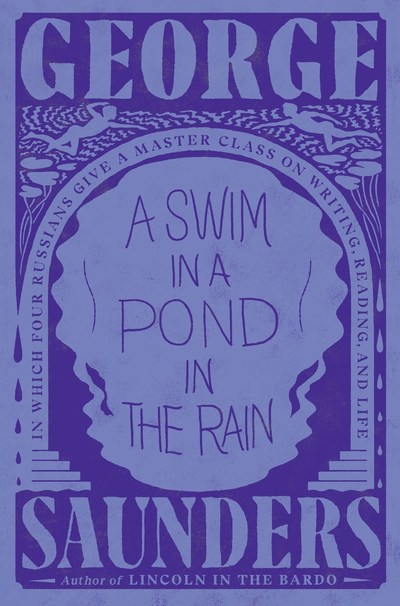George Saunders won the 2017 Man Booker Prize for his novel Lincoln in the Bardo and was a National Book Award finalist for his short story collection Tenth of December. But the acclaimed author has also taught for more than 20 years in Syracuse University’s prestigious MFA creative writing program. There, in a semester-long class, he and his aspirants parse Russian short stories in translation to better understand how masters of the form such as Anton Chekhov and Nikolai Gogol built their work from the ground up. For an emerging writer, Saunders believes, this process is akin to “a young composer studying Bach. All of the bedrock principles of the form are on display.”
Now, in a true gift to writers and serious readers, Saunders has adapted the core of this coveted class into a commodious new book, A Swim in a Pond in the Rain: In Which Four Russians Give a Master Class on Writing, Reading, and Life.
Beloved author George Saunders teaches the masters in his new book, sharing invaluable insights into classic Russian short stories.
With infectious enthusiasm and generosity of spirit, Saunders delves into seven stories that he calls the “seven fastidiously constructed scale models of the world”: three by Chekhov, two by Leo Tolstoy and one each from Ivan Turgenev and Gogol. (The actual syllabus at Syracuse contains about 30 stories.) The primary texts of the featured stories are included in the book, and after each one, Saunders launches into his “seminar,” providing insights—both his own and some gleaned from students over the years—into the structure and subtleties of these works.
On the surface, this may seem a dry endeavor. However, in Saunders’ hands it is anything but. His love of literature is palpable, and his obvious qualities as an artful teacher are on full display. Saunders takes a different tack with each story, sometimes providing pulse-by-pulse dissections, other times analyzing the building of character or even how the excesses of a story somehow manage to contribute to rather than detract from its greatness. He also supplies an “afterthought” to each story’s analysis, in which he shares a personal anecdote from his own life as a writer and reader.
While the genesis of A Swim in a Pond in the Rain can be found in the creative writing classroom—and writers at any level of their careers will glean priceless pearls from nearly every page—the genius of Saunders’ book, and his clear intention in offering it up, is to elucidate literature for the engaged reader, deepening the reading experience. It is also a blueprint for a greater engagement with humanity. “The part of the mind that reads a story is also the part that reads the world,” Saunders writes. “It can deceive us, but it can also be trained to accuracy; it can fall into disuse and make us more susceptible to lazy, violent, materialistic forces, but it can also be urged back to life, transforming us into more active, curious, alert readers of reality.”
ALSO IN BOOKPAGE: Read our starred review of the audiobook for A Swim in a Pond in the Rain.




